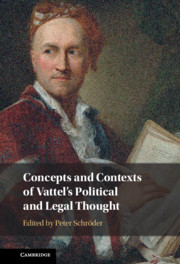Book contents
- Concepts and Contexts of Vattel’s Political and Legal Thought
- Concepts and Contexts of Vattel’s Political and Legal Thought
- Copyright page
- Contents
- Contributors
- Acknowledgements
- Concepts and Contexts of Vattel’s Political and Legal Thought
- Part I Historical and Intellectual Contexts
- Part II Concepts
- Part III Receptions
- 10 Vattel’s Reception in British America, 1761–1775
- 11 Tradition and Revolution
- 12 Vattel’s Law of Nations in Late Eighteenth- and Early Nineteenth-Century Greece and Italy
- 13 Reception of Vattel in Eighteenth- and Early Nineteenth-Century England and Scotland
- 14 Receptions of Vattel in Nineteenth- and Twentieth-Century International Law
- 15 Vattel’s Reception in International Relations
- Index
- References
13 - Reception of Vattel in Eighteenth- and Early Nineteenth-Century England and Scotland
from Part III - Receptions
Published online by Cambridge University Press: 11 June 2021
- Concepts and Contexts of Vattel’s Political and Legal Thought
- Concepts and Contexts of Vattel’s Political and Legal Thought
- Copyright page
- Contents
- Contributors
- Acknowledgements
- Concepts and Contexts of Vattel’s Political and Legal Thought
- Part I Historical and Intellectual Contexts
- Part II Concepts
- Part III Receptions
- 10 Vattel’s Reception in British America, 1761–1775
- 11 Tradition and Revolution
- 12 Vattel’s Law of Nations in Late Eighteenth- and Early Nineteenth-Century Greece and Italy
- 13 Reception of Vattel in Eighteenth- and Early Nineteenth-Century England and Scotland
- 14 Receptions of Vattel in Nineteenth- and Twentieth-Century International Law
- 15 Vattel’s Reception in International Relations
- Index
- References
Summary
In his Examination of the British doctrine which subjects to capture a neutral trade not open in time of peace (1806), the would-be fourth president of the United States, James Madison, affirmed that ‘[t]he reputation that Vattel enjoys in Great Britain, greater perhaps than he enjoys anywhere else, requires that he should be particularly consulted on this subject’. Madison did not stress the ‘originality of his plan, or his matter’, which he suggested Vattel had derived from the German philosopher Christian Wolff, but rather the way in which the Swiss jurist ‘in many instances, improved the doctrines of all his predecessors’.1 Madison’s consideration about Vattel’s reputation in Britain is confirmed by the numerous references to the author of the Law of Nations in late eighteenth and early nineteenth-century English and Scottish journals.
- Type
- Chapter
- Information
- Concepts and Contexts of Vattel's Political and Legal Thought , pp. 258 - 276Publisher: Cambridge University PressPrint publication year: 2021

